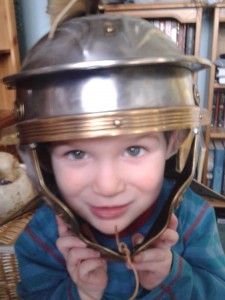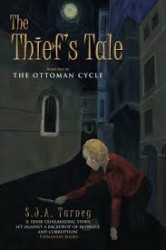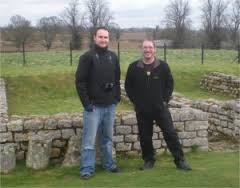SJA Turney talks Rome, the Ottoman Empire and earning a living the Indie way
Richard Lee
SJA Turney is an Indie published author of Roman military novels who is giving the mainstream-published authors a proper run for their money. I’m eager to catch up with the latest Fronto book (Marius’ Mules V – Hades’ Gate) and to hear how Simon has achieved his dream of writing for a living.
RL: Tell us about Fronto, Balbus and the other characters who are the main protagonists in your books.
SJAT: Fronto was my first ever protagonist. There’s a chunk of myself in there, along with a few traits that I wish I had. He is created as something of a mixed bag, part hero, part anti-hero, with as many negative facets as positive. I think that is why he’s had the appeal that he seems to have enjoyed with readers. Everyone can identify with him better than with a true-blue-hero type. I always have a physical image in mind when writing (though I keep my descriptive deliberately sparse in order to give the reader more opportunity to fill in the blanks with their mind’s eye. Physically, I had the actor Gary Oldman in mind for Fronto, the emperor Vespasian for Balbus, the actor Alfred Molina for Longinus. Characters come and go across the series as is only natural in a time of brutal war, though the core remain Fronto, Balbus, Priscus and Caesar.
RL: I gather your Caesar is a bit of a schemer. What’s it like writing about the great man? Is the series going to follow him to the end?
SJAT: I have been both lauded and criticised for my portrayal of the great general in particular, since he shares more traits with a Franco, a Napoleon, or even a Hitler than the traditional image – ruthless, political, perhaps heartless in some ways, and very much centred around his own advancement at the cost of anything and everything. Caesar is the Yang to Fronto’s Yin. The series has the immediate goal of reaching the end of the Gallic Wars (which it will in book 7). There will almost certainly be a book 8-9 pushing Caesar across the Rubicon. There is also, then, a tentative plan to follow the series on through the Civil Wars and to the events of March 44BC. By then, Fronto will be an old man, but it would be a natural end to the whole saga. Essentially, I will always be happy to write to that conclusion as long as readers are happy to read it.
RL: Marius’ Mules seem part political, part battle. Which do you prefer writing?
SJAT: Ooh, both. I have recently moved more into writing a more political/thriller style of tale, but I still enjoy a good old bloodbath every now and then. MM5 is once more a nice mix of the two, but the books going on will deal with the great revolt of the Gauls under Vercingetorix, so there will be much a return to military form there. I have always tried to make my battle scenes as personal as possible – to give the reader a soldier’s eye view of the events, which hopefully makes the action easier to follow. In short I love both. I think the one is needed as a palate-cleanser to the other for both myself and the readers.
 RL: I know a lot of female readers love soldier books. Do the MMs have a fan base with women? Do you write anything consciously for a female audience?
RL: I know a lot of female readers love soldier books. Do the MMs have a fan base with women? Do you write anything consciously for a female audience?
SJAT: I have been surprised at the number of female readers I have, actually, given the very male-oriented world of the stories. I think perhaps Fronto appeals to the mothering instinct! He is often confused and in need to sorting out. Also, the women that do appear in the series (Fronto’s sister and mother, Balbus’ daughters, Caesar’s niece and Clodius’ sister for example) are all strong characters – often stronger in mind and spirit than the men, I suspect. Roman history is replete with strong women behind the powerful men, so I think that echoes the society well. I am also surprised (and in no small awe) of the number of soldiers and veterans who contact me with complements on how I’ve managed to capture the life, troubles and cameraderie of the forces. That always impresses me.
RL: I saw that one of the characters appears to be Titus Pullo from HBO’s Rome series. Is that the case? Are you influenced by the TV portrayal?
SJAT: Ha. Actually, Pullo and Vorenus are two of the centurions mentioned in Caesar’s own diary, so their appearance was inevitable. In fact, I’ve done what I can to remove them thoroughly from the HBO portrayal (not because it was bad – I thoroughly enjoyed the series – but to keep things different. In fact, Pullo and Vorenus were, if anything, more colourful in reality than in the series. They must certainly have been characters, given Caesar’s notes about them. The pair seem to have been vying with one another for seniority throughout the campaign.
 RL: Marius’ Mules V – Hades” Gate is 170,000 words – quite a slab – no spoilers, but what happens?
RL: Marius’ Mules V – Hades” Gate is 170,000 words – quite a slab – no spoilers, but what happens?
SJAT: A big question! Most of my books are good high word-counts, not by design, but because it seems impossible to tell the story in less. MMV follows very much dual plotlines. For those who’ve read book 4, the story had ended with something of a division between Fronto and Caesar and there is a rift to be healed. Book 5 follows Fronto’s progress in Rome and Puteoli as he tries to adjust to a life away from the war, while circumstances constantly push him back. Meanwhile his old comrade Priscus is filling his place in Gaul and learning what it is to be Fronto while cracks appear in Caesar’s army, needing men like Fronto to put it right. Book 5 is a turning point in the story so far.
RL: Talk me through your Indie process. Do you get copy editing? Do you do your own covers? Do you do the techie stuff of epublishing? Do you have a checklist for publicity? (etc). I guess it’s really tough to have all the jobs fall in your lap.
SJAT: The bugbear of the self-publishing world! It is still a constant learning process for me. When I started out (which was relatively early in the days of self-publishing, I did everything myself, right down to the editing and checking and cover art. It was troublesome and time consuming, and the early editions of the books were somewhat riddled with typos and errors. Gradually, as I got used to it, I’ve learned a lot more of the trade and put more of the steps of traditional publishing into my work. Fortunately, I have come to know a number of fabulous people over that time. I now have a small cadre of very good proofers and copy editors, each of who reads through my completed manuscripts and gives me comments. Without them, the books would come out very differently. Also, I have met Dave Slaney who designed the excellent covers for the latest releases and the great guys at Roman Tours of Chester who provided the models for them. Now, people who are far more artistic than I are producing the covers for me. My process now is to write the draft, run a complete edit myself, then four more edits by independent readers, and then finally produce a finished version. That is then combined with the cover and I begin the tortuous process of publishing myself. In a way it is time-consuming and bothersome, but at the same time it does leave all control in my hands, which has its advantages. I produce various different formats, for the paperback versions, which are now going through CreateSpace, the kindle versions, which are managed directly through Amazon, the Google Play editions, and then a version for Smashwords that is distributed for Sony, Kobo, iTunes, etc. The process changes slightly each time I produce a book, as I am still learning and honing the system, but each time it becomes slightly easier and I think the results are much better. As to the promotional side, I am still very much learning there. I find some writers so pushy that it makes me actively avoid reading their work, while others are so quiet they are almost unsung and I only catch their books by accident. The middle ground is clearly where to go for. I seem to have hit that but largely by accident. I’m not a very pushy person (my wife pushes my work more than I ever do) and much of the promotion for my latest book is the result of a snowball effect that started five years ago and has been heightened by the help and support of some particularly fabulous people I have met along the way. I owe much of the success of the series to some excellent reviewers and supporters.
 RL: You have a wife and young family, yet you pay your way through your books. Is that incredible pressure, or incredible freedom?
RL: You have a wife and young family, yet you pay your way through your books. Is that incredible pressure, or incredible freedom?
SJAT: Simply: both. I always hoped to reach the point where I could write for a living, though never actually expected it to happen. It just occurred through luck. I was filling every hour I could with a full-time job, a baby boy and writing when the chance arose. Things suddenly exploded around a year and a half ago and book sales bloomed at exactly the same time as both my wife and I were made redundant. If I were superstitious I would consider that a sign! The timing was just right, and I slid from that world into this almost by accident. There is a great deal of pressure. Last year, I timed my releases badly and things were tight for a while, but at the same time, nothing beats the ability to work where I do, with my little boy bringing my occasional welcome interruptions and having the flexibility to be there for the family when needed. I wouldn’t want it any other way now.
 RL: Tell us about your other books.
RL: Tell us about your other books.
SJAT: I have a series of Historical Fantasy books out (Interregnum, Ironroot, and Dark Empress), which are heavily influenced by late Rome and, to be honest, have more in common with Roman fiction than other fantasy. They are to some extent my attempt to emulate Guy Gavriel Kay who has always been my favourite author. While they are less popular and well known than the Marius’ Mules series, they have a loyal following who tell me that they are actually my best work. One day I may write a fourth book, but for now, my sights are set solidly in the Historical genre. I recently released The Thief’s Tale, which is set in early Ottoman Istanbul, and later this year, the second book of that trilogy will be ready. Already the Ottoman Cycle is starting to gain as strong a reputation as Marius’ Mules, for which I’m truly pleased. I also have a small stable of planned works for the future: another Roman work in collaboration with Gordon Doherty, a tale set during the Byzantine/Arab troubles, a Samurai story, a renaissance murder mysery and more. Plus, I have a completed and separate Roman work that is still unpublished and under wraps that might see the light of day this year. It’s all go and plenty of variety, but then that is the spice of life, eh?
RL: Golden Apple of Discord moment: which of the Roman hf authors writing today do you most enjoy?
SJAT: Argh! That really is a wicked question, given the quality of some of the writers out there. Many of the Roman authors deserve that place, as they all write slightly different styles and eras, and it’s difficult to rank them. I’m particularly a fan of Ben Kane, Anthony Riches and Douglas Jackson above most of the already talented crowd, but the best individual book in the Roman genre I have read in recent years was Rome: The Art of War by M.C. Scott.









